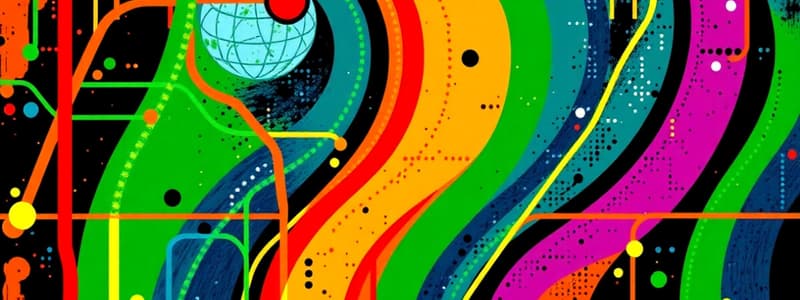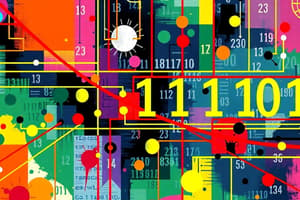Podcast
Questions and Answers
When did the concept of an internet begin?
When did the concept of an internet begin?
The Cold War in the 1960s
What was the purpose of the communications system designed by the US Army during the Cold War?
What was the purpose of the communications system designed by the US Army during the Cold War?
To withstand a possible attack with nuclear weapons
What was the name of the network established in 1969?
What was the name of the network established in 1969?
ARPANET
What was the belief regarding the size of the network in case of a nuclear attack?
What was the belief regarding the size of the network in case of a nuclear attack?
What common protocol was established in 1974?
What common protocol was established in 1974?
What was the primary use of the internet until the early 1990s?
What was the primary use of the internet until the early 1990s?
What feature was introduced in 1991 that enabled the inclusion of graphics, animation, video, and sound?
What feature was introduced in 1991 that enabled the inclusion of graphics, animation, video, and sound?
When did the internet become widely known and used?
When did the internet become widely known and used?
What is the Internet Protocol (IP)?
What is the Internet Protocol (IP)?
The IP breaks data down into digital packets before transmission.
The IP breaks data down into digital packets before transmission.
What does the IP tell the network about each packet?
What does the IP tell the network about each packet?
Traditional phone calls create a circuit between two phones.
Traditional phone calls create a circuit between two phones.
How does the IP allow phones to send packets onto a network?
How does the IP allow phones to send packets onto a network?
What is the internet described as?
What is the internet described as?
What is the World Wide Web (WWW) compared to?
What is the World Wide Web (WWW) compared to?
What is the internet compared to?
What is the internet compared to?
What is the core of the internet?
What is the core of the internet?
Routers are only connected to each other.
Routers are only connected to each other.
How do big institutions access the internet?
How do big institutions access the internet?
How do other users access the internet?
How do other users access the internet?
How is data transmitted efficiently?
How is data transmitted efficiently?
What is the system of transmission called?
What is the system of transmission called?
What is Internet bandwidth?
What is Internet bandwidth?
What are other functions of the internet?
What are other functions of the internet?
Sending an email is similar to sending a paper letter.
Sending an email is similar to sending a paper letter.
Which of these are advantages of email compared to paper letters? (Select all that apply)
Which of these are advantages of email compared to paper letters? (Select all that apply)
What is an inbox?
What is an inbox?
Where are unread messages typically displayed?
Where are unread messages typically displayed?
From where can you get an email account? (Select all that apply)
From where can you get an email account? (Select all that apply)
What makes up an email address?
What makes up an email address?
What kind of program is needed to use emails?
What kind of program is needed to use emails?
Getting information in the past was more difficult than today.
Getting information in the past was more difficult than today.
What is considered a library that is more powerful than any on the planet?
What is considered a library that is more powerful than any on the planet?
The WWW is over 100 years old.
The WWW is over 100 years old.
The internet and the WWW are the same thing.
The internet and the WWW are the same thing.
What is the WWW compared to regarding the internet?
What is the WWW compared to regarding the internet?
What are the basis of the web?
What are the basis of the web?
What is a collection of web pages called?
What is a collection of web pages called?
What did you need to know before search engines to find a website?
What did you need to know before search engines to find a website?
What do search engines allow users to do?
What do search engines allow users to do?
What are the reasons for the popularity of search engines?
What are the reasons for the popularity of search engines?
How does Google show results?
How does Google show results?
What new verb has been created due to Google?
What new verb has been created due to Google?
Flashcards
ARPANET
ARPANET
A network of computers designed during the Cold War for military communication.
TCP/IP
TCP/IP
A common protocol used to connect different computers on the internet.
Internet
Internet
The global network that connects computers and allows communication and information sharing.
World Wide Web (WWW)
World Wide Web (WWW)
Signup and view all the flashcards
Internet Core
Internet Core
Signup and view all the flashcards
Router
Router
Signup and view all the flashcards
Internet Service Provider (ISP)
Internet Service Provider (ISP)
Signup and view all the flashcards
Packet Switching
Packet Switching
Signup and view all the flashcards
Internet Bandwidth
Internet Bandwidth
Signup and view all the flashcards
Internet Telephony
Internet Telephony
Signup and view all the flashcards
Internet Protocol (IP)
Internet Protocol (IP)
Signup and view all the flashcards
Data Packets
Data Packets
Signup and view all the flashcards
Circuit Switching
Circuit Switching
Signup and view all the flashcards
Routers
Routers
Signup and view all the flashcards
Email
Signup and view all the flashcards
Inbox
Inbox
Signup and view all the flashcards
Email Address
Email Address
Signup and view all the flashcards
Email Client
Email Client
Signup and view all the flashcards
Free Webmail Service
Free Webmail Service
Signup and view all the flashcards
Email Broadcasting
Email Broadcasting
Signup and view all the flashcards
Email Forwarding
Email Forwarding
Signup and view all the flashcards
Email Attachment
Email Attachment
Signup and view all the flashcards
Website
Website
Signup and view all the flashcards
Search Engine
Search Engine
Signup and view all the flashcards
Googling
Googling
Signup and view all the flashcards
Search Engine Ranking
Search Engine Ranking
Signup and view all the flashcards
Web Address (URL)
Web Address (URL)
Signup and view all the flashcards
Online Library
Online Library
Signup and view all the flashcards
Internet Access
Internet Access
Signup and view all the flashcards
Study Notes
The Development of the Internet
- The concept of an internet began during the Cold War in the 1960s.
- The US Army designed communications systems with computers that could withstand a possible nuclear attack.
- In 1969, ARPANET was established.
- ARPANET consisted of dozens of military sites linked across the USA.
- The military believed a larger network would be stronger in case of attack.
- In 1974, a common protocol called TCP/IP was established.
- In the late 1970s, people began using the network for various purposes, including university research and business.
- This marked the development of the idea of an international network.
- Until the early 1990s, the internet was primarily used for exchanging text.
- World Wide Web was introduced in 1991, enabling graphics, animation, video, and sound.
- Personal computers became more widely available in the 1990s, making the internet more accessible to people worldwide.
- By 2000, the internet was globally known and used.
Internet Telephony
- Internet Protocol (IP) is at the heart of internet telephony.
- IP is a language personal computers use to communicate with each other.
- It provides a faster and cheaper method of sending information.
- Data is broken down into digital packets and transmitted.
- Packets contain various types of data, such as text, video, and conversations.
- IP guides the network on how to read and send packets.
- Traditional phone calls create a direct circuit between phones.
- IP allows phones to send packets over a network for sorting and delivery by routers.
The Internet and its Core
- The internet is a worldwide computer network.
- The entire world utilizes the internet.
- It can be thought of as a global highway that connects computers across the world.
- The World Wide Web (WWW) is like the traffic on this highway, including video, music, downloading, and instant messaging, etc.
- The core of the internet comprises powerful computers called routers.
- Routers are connected to each other and other networks.
- Institutions often have direct internet access via their own servers.
- Users often access the internet through Internet Service Providers (ISPs).
- Data is divided into smaller pieces—packets—for efficient transmission.
- Packet switching is the method used to transmit data.
- Internet bandwidth indicates the data transmission speed per second.
- The internet helps people perform various tasks and run new applications.
Emails
- Sending an email is similar to sending a paper letter.
- Emails offer faster and cheaper communication than traditional mail.
- Emails can be sent to multiple recipients at once.
- Email messages can include attachments like files and images.
- To exchange emails, users need addresses for sending and receiving.
- Email inboxes are electronic folders for incoming messages.
- Emails are often marked in bold font when newly received.
- Emails can be obtained from Internet Service Providers (ISPs) or free web services.
- Email addresses consist of an identifier, the "@" symbol, and a domain.
- Email programs like Mozilla or Outlook are needed to use emails.
The World Wide Web (WWW)
- In the past, researching or writing involved physically going to a library.
- The World Wide Web (WWW) is relatively recent, only being 25 years old.
- The WWW organizes the internet's information into a collection of pages and images accessible online.
- The internet forms the highway, and the WWW is the traffic on it.
- Websites are collections of web pages.
- Pages include images and multimedia
- Websites allow users to access music, videos, and animations.
Search Engines
- Before search engines, users needed to know exact website addresses.
- Search engines like Google and Bing help find information quickly by typing keywords into a search box.
- Search engines have become popular due to their vast archives and fast search speeds.
- Results shown on Google are ranked by popularity.
- The more frequently a site is accessed, the higher it appears in search results.
- The term "google" has become a verb reflecting the use of Google's search function.
Studying That Suits You
Use AI to generate personalized quizzes and flashcards to suit your learning preferences.




